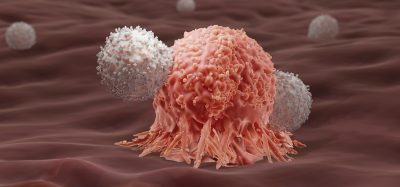Nanoparticles inhibit liver cancer tumour growth in study
Posted: 26 January 2016 | Victoria White | No comments yet
Scientists from UTSW have crafted synthetic “dendrimer” nanoparticles that are able to provide a tumour-suppressing effect without further damaging the liver or neighbouring tissue…


Chemists from UT Southwestern (UTSW) Medical Centre have successfully used synthetic nanoparticles to deliver tumour-suppressing therapies to diseased livers with cancer.
Late-stage liver cancer is a major challenge for therapeutic intervention. Drugs that show promise in healthy functioning livers can cause devastating toxicity in cirrhotic livers with cancer, the researchers explained.
The scientists crafted synthetic “dendrimer” nanoparticles that are able to provide the tumour-suppressing effect without further damaging the liver or neighbouring tissue.
“We have synthesised highly effective dendrimer carriers that can deliver drugs to tumour cells without adverse side effects, even when the cancerous liver is consumed by the disease,” said Dr Daniel Siegwart, Assistant Professor of Biochemistry and with the Harold C. Simmons Comprehensive Cancer Centre. “We found that efficacy required a combination of a small RNA drug that can suppress cancer growth and the carrier, thereby solving a critical issue in treating aggressive liver cancer and providing a guide for future drug development.”
miRNA nanoparticles dramatically extended survival in mouse models
The recent failure of five Phase III human clinical trials of small-molecule drugs to treat hepatocellular carcinoma – the most common form of liver cancer – prompted Dr Siegwart and his colleague Dr Hao Zhu, Assistant Professor at the Children’s Medical Centre Research Institute at UTSW, to develop non-toxic carriers and explore MicroRNA (miRNA) therapies as a promising alternative. miRNAs are short nucleic acids that can function as natural tumour suppressors, but require delivery strategies to transport these large, anionic drugs into cells. To date, no existing carrier has been able to provide effective delivery to late-stage liver cancer without amplified toxicity, which negates the desired effect.
To address this problem, UTSW scientists chemically synthesized more than 1,500 different types of nanoparticles, which allowed discovery of lead compounds that could function in the heavily compromised cancerous liver. Synthetic, man-made nanoscale compounds called dendrimers provided an opportunity to screen different combinations of chemical groups, physical properties, and molecular size, Dr Siegwart said. This approach led to the identification of dendrimers to deliver miRNA to late-stage liver tumours with low liver toxicity.
The study, conducted in genetic mouse models with a highly aggressive form of liver cancer, demonstrated that the miRNA nanoparticles inhibited tumour growth and dramatically extended survival.
Related topics
Drug Delivery, miRNAs, Nanoparticles, Oncology
Related organisations
UT Southwestern








